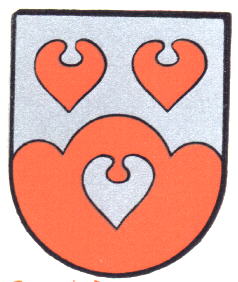Lienen: Difference between revisions
Jump to navigation
Jump to search
Knorrepoes (talk | contribs) m (Text replacement - "/Arms of " to "/Arms (crest) of ") |
Knorrepoes (talk | contribs) m (Text replacement - "{{media}}" to " {{de1}} {{media1}}") |
||
| Line 23: | Line 23: | ||
As no historical seals or arms were known, the above arms were proposed by the State Archives of Prussia. The three small hills are a canting element, Lienen is derived from (Berg)Lehne, or place next to a range of hills. The three water lilly leaves are taken from the arms of the Counts of Tecklenburg as well as those of the Tecklenburg district, to which the village historically belonged. | As no historical seals or arms were known, the above arms were proposed by the State Archives of Prussia. The three small hills are a canting element, Lienen is derived from (Berg)Lehne, or place next to a range of hills. The three water lilly leaves are taken from the arms of the Counts of Tecklenburg as well as those of the Tecklenburg district, to which the village historically belonged. | ||
{{ | |||
{{de1}} | |||
{{media1}} | |||
[[Civic Heraldry Literature - Germany|'''Literature''']]: Meijer, 1940 | [[Civic Heraldry Literature - Germany|'''Literature''']]: Meijer, 1940 | ||
Revision as of 11:11, 26 December 2022
This page is part of the German heraldry portal Deutsche Wappensammlung |
Heraldry of the World |
|
German heraldry:
|
Selected collector's items from Germany:
|
LIENEN
State : Nordrhein-Westfalen
District (Kreis) : Steinfurt (until 1975 Tecklenburg)
| German | In silbernen Schilde ein roter Dreiberg, das Ganze belegt mit drei 2:1 gestellten Seeblättern in verwechselten Farben. |
| English | No blazon/translation known. Please click here to send your (heraldic !) blazon or translation |
Origin/meaning
The arms were officially granted on February 18, 1939.
As no historical seals or arms were known, the above arms were proposed by the State Archives of Prussia. The three small hills are a canting element, Lienen is derived from (Berg)Lehne, or place next to a range of hills. The three water lilly leaves are taken from the arms of the Counts of Tecklenburg as well as those of the Tecklenburg district, to which the village historically belonged.
Literature: Meijer, 1940


